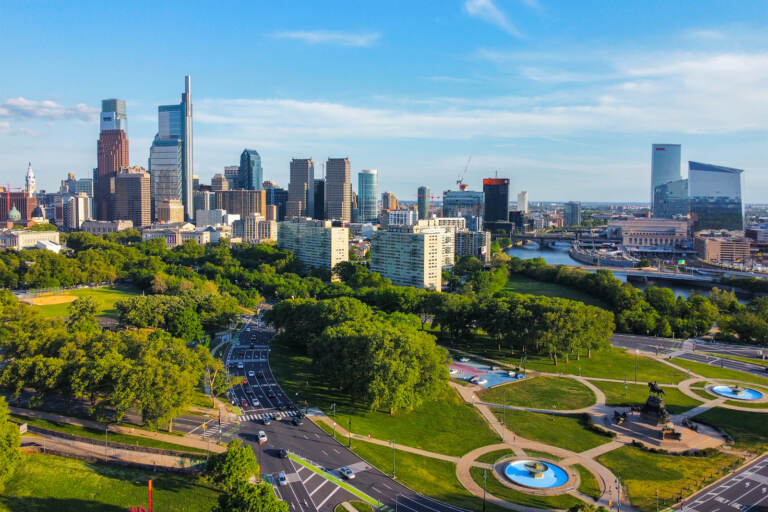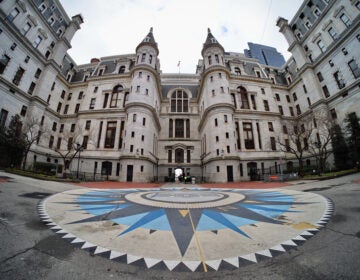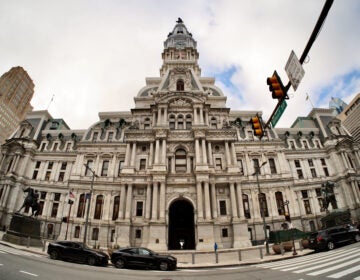Opinion: Philly should prioritize green infrastructure with its federal dollars
With millions arriving to the city under the infrastructure program approved by Congress, the focus should be on green projects.

The Philadelphia skyline behind Eakins Oval. (Mark Henninger/Imagic Digital)
Philadelphia is approaching a critical opportunity that could help manage the impacts of climate change and benefit our communities for generations to come.
Funding from the Bipartisan Infrastructure Law, also known as the Infrastructure Investment and Jobs Act (IIJA), will soon lead to investments nationwide to ramp up infrastructure spending and building. The IIJA allocates $55 billion to be distributed to states for drinking water improvements, $71 billion for resiliency and climate change impacts, $43 billion for miscellaneous infrastructure, and $176 billion distributed for roads, bridges, and railways.
Each of these infrastructure funding opportunities will be crucial for Philadelphia and the region to make much-needed improvements to our region’s ability to adapt to the impacts of climate change, create opportunities for employment across education and income levels, and support much needed improvements for communities who have long been overlooked.
One way to accomplish these goals would be to advance our local green stormwater infrastructure (GSI) industry. The GSI industry spans many sectors and includes planning, design, engineering, construction, operations and maintenance, and material supply, and supports upwards of 34,000 workers across the Commonwealth.
GSI investments support small businesses and create family-sustaining jobs while providing access to equitably distributed, well-maintained public spaces, healthy rivers and streams, and other climate resilience projects.
By investing in GSI, Pennsylvania stands to reap billions of dollars in economic activity. The GSI industry has grown faster in Pennsylvania than the state’s overall growth rate, by nearly 3% over nearly a decade, proving that investing in GSI will lead to growth across the Commonwealth.
With millions of dollars in funding for much-needed improvements and projects, there will be a growing need for a large, diverse, and accessible workforce. Over the past decade, the industry has shown particular strength as an entry point for workers from all education levels, including those re-entering the workforce following incarceration or rehabilitation.
According to the GSI: A Tool for Economic Recovery and Growth in PA report from the Sustainable Business Network of Greater Philadelphia (SBN), an organization leading the way in advancements in the GSI industry, one in two workers earn more than $15/hour, even without a high school diploma or equivalent. Nine out of 10 GSI jobs in PA require a high school diploma or less, creating a viable career path for the 14% of Philadelphians who do not have a high school diploma, according to the most recent 2020 Census data.
The Justice40 Initiative makes Philadelphia particularly well positioned to benefit from the IIJA. Justice40 is the Biden Administration’s commitment to ensuring that forty percent of the benefits from the infrastructure package will be directly invested in underserved communities.
Unfortunately, Philadelphia remains the poorest big city in America, and many of our communities deal with a wide range of environmental justice issues, including extreme heat because of lack of tree canopy; flooding due to aging, overly burdened sewer systems, too much pavement, and failed urban revitalization projects; and concerns around legacy pollution.
Councilmember Katherine Gilmore Richardson knows how important it is to make these investments, as her mother grew up in North Philadelphia on a block that to this day has no trees.
As a member of the Local Government Advisory Committee of the U.S. Environmental Protection Agency, Councilwoman Gilmore Richardson has been working with representatives from around the country to help inform the EPA’s understanding of how to design and implement programs that will actually achieve Justice40’s goals. The Local Government Advisory Committee quickly moved to issue recommendations to Administrator Regan which were included in the EPA’s updated State Revolving Fund guidance.
Philadelphia is already an international leader on green infrastructure, putting us at a great advantage to apply for programs that will allow us to build nature-based investments for our communities. When the moment comes, having a green stormwater infrastructure industry poised to take on these projects will be vital to ensuring that all Philadelphians will be able to benefit when shovels hit the ground.
Katherine Gilmore Richardson is currently serving her first term as an At-Large member of Philadelphia City Council. She is the Chair of the Committee on the Environment and a member of the United States Environmental Protection Agency’s Local Government Advisory Committee. Recently, she received the GSI Champion Award at SBN’s 2022 6th Annual Excellence in GSI Awards.
Alex Cupo is the GSI Partners Manager for the Sustainable Business Network of Greater Philadelphia.

Subscribe to PlanPhilly
WHYY is your source for fact-based, in-depth journalism and information. As a nonprofit organization, we rely on financial support from readers like you. Please give today.









